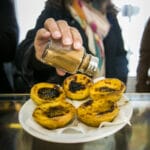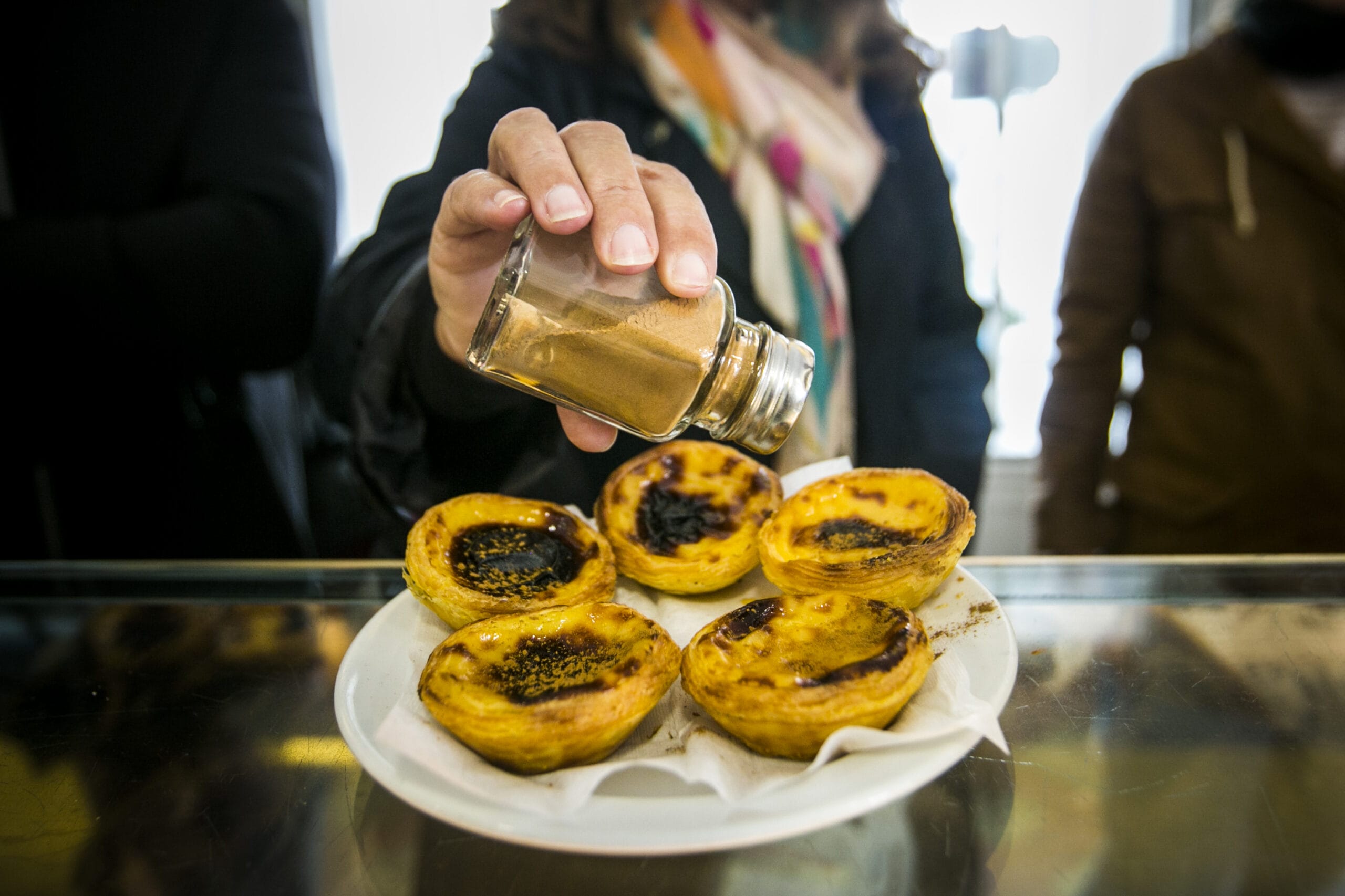Offering some of the world’s purest, most passionately produced chocolate, along with some of the best coffee in Lisbon, Bettina & Niccolò Corallo on Rua da Escola Politécnica in the Príncipe Real neighborhood has changed the tastes and habits of many locals. There’s no milk chocolate available at this family-run shop, only dark chocolate. And yet Portuguese chocolate lovers – who have a notorious sweet tooth – will swoon when one mentions Corallo’s products. As for the coffee, area residents now wait until 10 a.m., when the café opens, to have their morning brew here.
It’s a small coffee shop and the impressive letters Casa da Cortiça (“cork house”) from the previous business are still on the façade. Yet the scent of coffee attracts customers like a magnet. The venue moved here two years ago from a nearby location, where the owners had first opened shop in 2008. At first they exclusively sold coffee and cocoa from the islands of São Tomé and Príncipe – a former Portuguese colony, off the west coast of equatorial Central Africa – but in the new café they source coffee and cocoa from different countries, including Venezuela, Bolivia, the Dominican Republic, Ghana and Brazil.
Bettina & Niccolò Corallo chocolate highlights the pure quality of the cocoa. Sometimes they add special fruit or nuts, such as oranges from Calabria or hazelnuts from Piedmont, Italy, to their chocolates. “We buy directly from the producer to make sure we get these unique flavors,” explains Bettina Corallo, who runs the place with her sons, Niccolò and Amadeo.
One recent introduction is already a bestseller. It’s a 70% chocolate with toffee, sprinkled with cocoa nibs and flor de sal (the top layer of salt pans, removed manually, the same as the French fleur de sel) sourced from Castro Marim in Portugal’s East Algarve region, known for its salt production. The salty bits on top act as stealthy agents, opening up the taste buds to the marvelous combination of chocolate and toffee. Another popular chocolate has pepper and flor de sal, and pairs well with red wine, suggests Bettina. There are also small chocolates with pear liqueur, cherry liqueur or moscatel, a Portuguese fortified wine produced from the muscat grape.
Then there’s their famous sorbet, made from 100% chocolate, spring water and sugar, which is an exceptional delight. So is its wintertime “cousin,” the hot chocolate, made from the same ingredients – without any milk. What’s not to like at this place?
Yet it’s the coffee that is the original base of this family business, which has Italian, Portuguese and African ingredients – literally. Bettina is Portuguese and met Italian Claudio Corallo in Zaire (now the Democratic Republic of Congo) in the 1980s, when her father was the Portuguese ambassador to Kinshasa.  Bettina and Claudio lived in the country for nearly 20 years, reviving and running old coffee plantations that had fallen into disuse. When war broke out, they moved briefly to Italy, where they started a coffee-roasting business.
Bettina and Claudio lived in the country for nearly 20 years, reviving and running old coffee plantations that had fallen into disuse. When war broke out, they moved briefly to Italy, where they started a coffee-roasting business.
But then the family moved back to Africa, this time to São Tomé and Príncipe, where Claudio and Bettina worked hard to reconstruct abandoned coffee plantations, and then started experimenting with cocoa production. Claudio continues to live there, sustainably producing what is considered by aficionados to be some of the best chocolate in the world, seeing the process all the way through from the cocoa bean to the end product – something of a rarity in the chocolate business, in which cocoa beans are often sourced from one country and made into chocolate elsewhere. This type of farm-to-table production experience is probably another reason why they are so demanding when it comes not only to the produce they source but also to how they prepare the raw cocoa and the coffee beans in the café.
“Each coffee variety requires a different length of time for roasting; every day we roast coffee beans and cocoa beans, keeping all the freshness, aroma and the original flavors,” says Bettina, standing beside the huge roaster. And the details are impressive: They only use spring water for the coffee and the espresso machine is an Italian La Marzocco – handmade and considered to be the Ferrari of coffee makers. “Many people don’t know us but as soon as they see our green La Marzocco they come in,” says Bettina.
On a recent visit, the coffee of the day blended two varieties of Arabica from Brazil, an Arabica from Java and a small percentage of robusta to produce a full-bodied coffee. And it only gets better: At Bettina & Niccolò Corallo, the bica (the Portuguese word for espresso) comes with a complimentary piece of chocolate.
“Bom dia! Uma bica por favor,” says a regular client, asking for his morning shot of espresso. For those interested in both chocolate and coffee, there’s the mochaccino (cappuccino with chocolate) or the affogato (cocoa sorbet with an espresso).
This small café, where you can see coffee plants alongside cocoa pods, even attracts customers from other parts of the country, who visit to stock up on the handmade chocolate. Bettina comments: “It’s interesting how the Portuguese are coming to love dark chocolate – less sweet, without any milk, vanilla or lecithin – as they get more familiar with it.”
One final note: The rich, creamy brownie with hazelnuts is a guilty pleasure to take away, especially for days spent walking up and down the hills of Lisbon…
 October 1, 2019 Beyond Bouillabaisse: Diving into Marseille’s Multicultural Stew
October 1, 2019 Beyond Bouillabaisse: Diving into Marseille’s Multicultural Stew
Quick Bite: Join this epic food tour in Marseille to discover the diverse flavors, […] Posted in Marseille April 4, 2024 DEMO – Lisbon Awakens: A Culinary Crossroads, Reborn
April 4, 2024 DEMO – Lisbon Awakens: A Culinary Crossroads, Reborn
Quick Bite: On this food tour in Lisbon, we’ll experience a cultural feast, tasting some […] Posted in Lisbon January 10, 2017 Lisbon Awakens: A Culinary Crossroads, Reborn
January 10, 2017 Lisbon Awakens: A Culinary Crossroads, Reborn
Quick Bite: On this food tour in Lisbon, we’ll experience a cultural feast, tasting some […] Posted in Lisbon
Published on February 19, 2016
Related stories
October 1, 2019
MarseilleQuick Bite: Join this epic food tour in Marseille to discover the diverse flavors, people and places that make this vibrant port city so irresistible. Though the capital of Provence and France’s 2nd-largest city, Marseille proudly grooves to its own Mediterranean beat – a mash-up of big-city grit and small-town sociability mixed with seagull squawks…
April 4, 2024
LisbonQuick Bite: On this food tour in Lisbon, we’ll experience a cultural feast, tasting some of the most diverse bites of the city’s gastronomy and meeting the people behind them. The oldest city in Western Europe, once the hub of a trading empire that connected Macau in the east to Rio de Janeiro in the…
January 10, 2017
LisbonQuick Bite: On this food tour in Lisbon, we’ll experience a cultural feast, tasting some of the most diverse bites of the city’s gastronomy and meeting the people behind them. The oldest city in Western Europe, once the hub of a trading empire that connected Macau in the east to Rio de Janeiro in the…
















































































